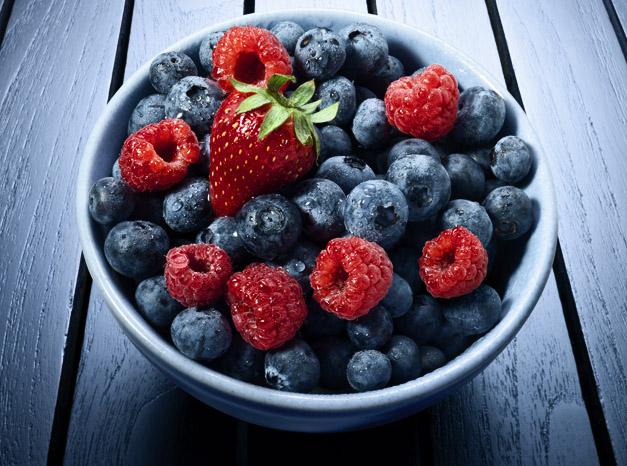
In a time where fad diets and celebrity eating habits are the news, how can we avoid being carried away by the winds of media hype and sensationalism? The bad news is that none of these so-called diets can actually be sustained, long-term. The good news is that the answer lies in making a few simple lifestyle changes and forming healthy habits. Healthy eating is about eating a variety of foods in moderation. This way your body gets all the goodness it needs. The information below is for the general population. Always seek individual advice from a Registered Dietitian.
Ideally you should aim to have:
3 regular meals based on starchy carbohydrates such as rice, bread, breakfast cereals, pasta, cous cous, potatoes, yam, plantain. Carbs are your body’s main source of fuel (energy) and contrary to popular belief they are not fattening until we add fats to them or eat them in very large quantities.
3 portions of fruit and 2 portions of vegetables daily.
These are great snacks and provide important vitamins and minerals as well as fiber. Fruit juice can count towards your fruit portions but only one medium-sized glass per day.
Less fatty, salty and sugary foods
Limit quantities of these foods and choose reduced or low fat/salt/sugar versions. Avoid adding salt at the table and consider using artificial sweeteners instead of sugar.
6-8 glasses of fluid daily.
This includes water, tea, coffee, milk, fruit juices and no added sugar squashes and soft drinks.
Moderate amounts of poultry, meat, fish and pulses.
Always remove skin from poultry, excess fat from meat and avoid frying.
An adequate intake of Omega-3 fats.
Amongst other benefits omega-3 fats can help look after your heart. Have at least one portion of oily fish (mackerel, salmon, fresh tuna, sardines, herring, kippers, pilchards) weekly. You can have up to 4 portions a week but no more than 2 if you are pregnant, breastfeeding or of childbearing age.
Plant sources include Soya, walnuts, dark green vegetables, rapeseed/canola oil (use sparingly).
3 portions of dairy products daily, preferably choosing reduced fat versions.
A portion = 200ml of milk, a pot of yogurt or 30g of cheese.
Other elements of a healthy lifestyle include regular activity and making time for some well deserved R&R (rest and relaxation). Activity-wise, it is recommended that you aim for at least 30 minutes daily, at least 5 days a week. Everyday activities such as using the stairs instead of the lift, brisk walking, swimming, dancing to your favorite music (fast moves only!) and even housework count.
The key thing is to get your heart beating faster. You should be breathless and not speechless i.e. you should be out of breath but still be able to carry out a conversation. Break your 30mins into three 10-minute slots or two 15-minute slots if you choose. Gradually increase your activity time and speak with your GP first if you have been inactive for some time or have any health conditions. Enthusiasts can choose to join a gym, go swimming, bike-riding etc.
In our hectic, modern world we all need time to chill and recharge our batteries. There is nothing like a holiday or a soothing soak to get you fired up again. Do something you really enjoy: reading, socializing with friends, watching a funny movie. Laughter is great medicine, so have a good laugh (even if it’s at yourself), and don’t take life too seriously.
Remember, there are no ‘good’ or ‘˜bad’ foods, just healthy or unhealthy diets. Set yourself some healthy lifestyle goals and aim to achieve them. Forming new habits can take time so you need to be persistent. Finally, realize that making small manageable changes will result in one big noticeable difference – so start your journey towards a healthier lifestyle today!

